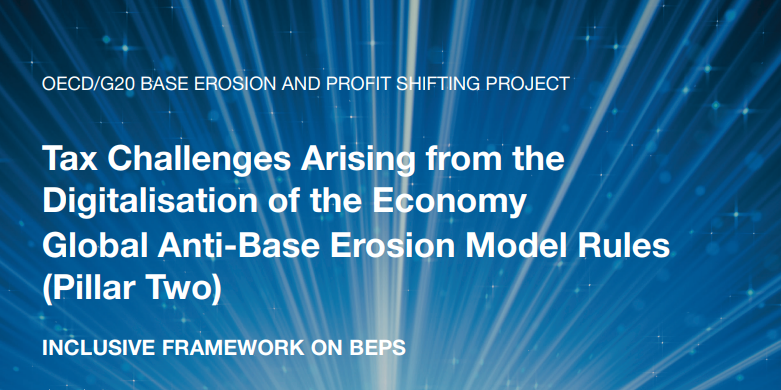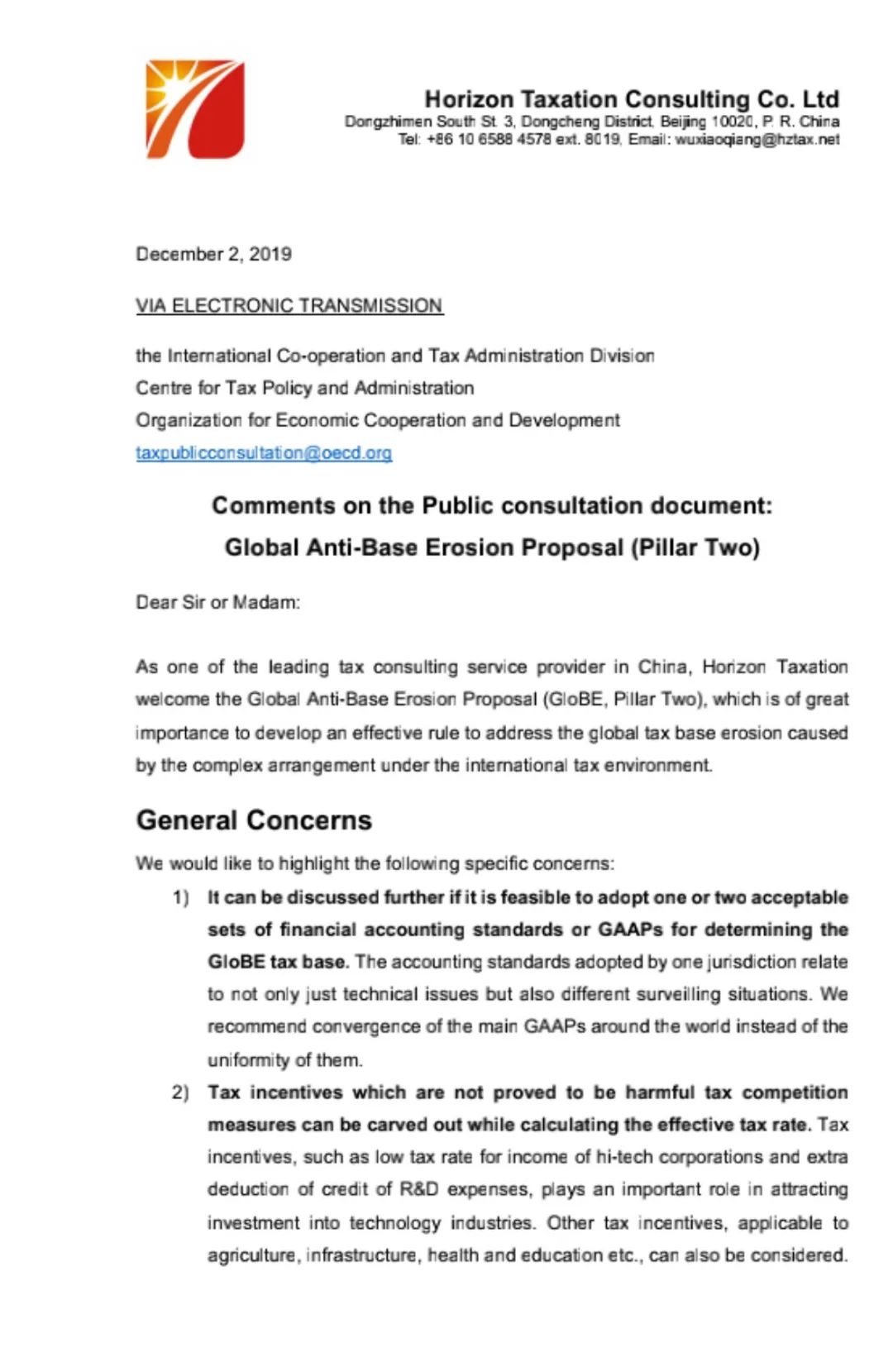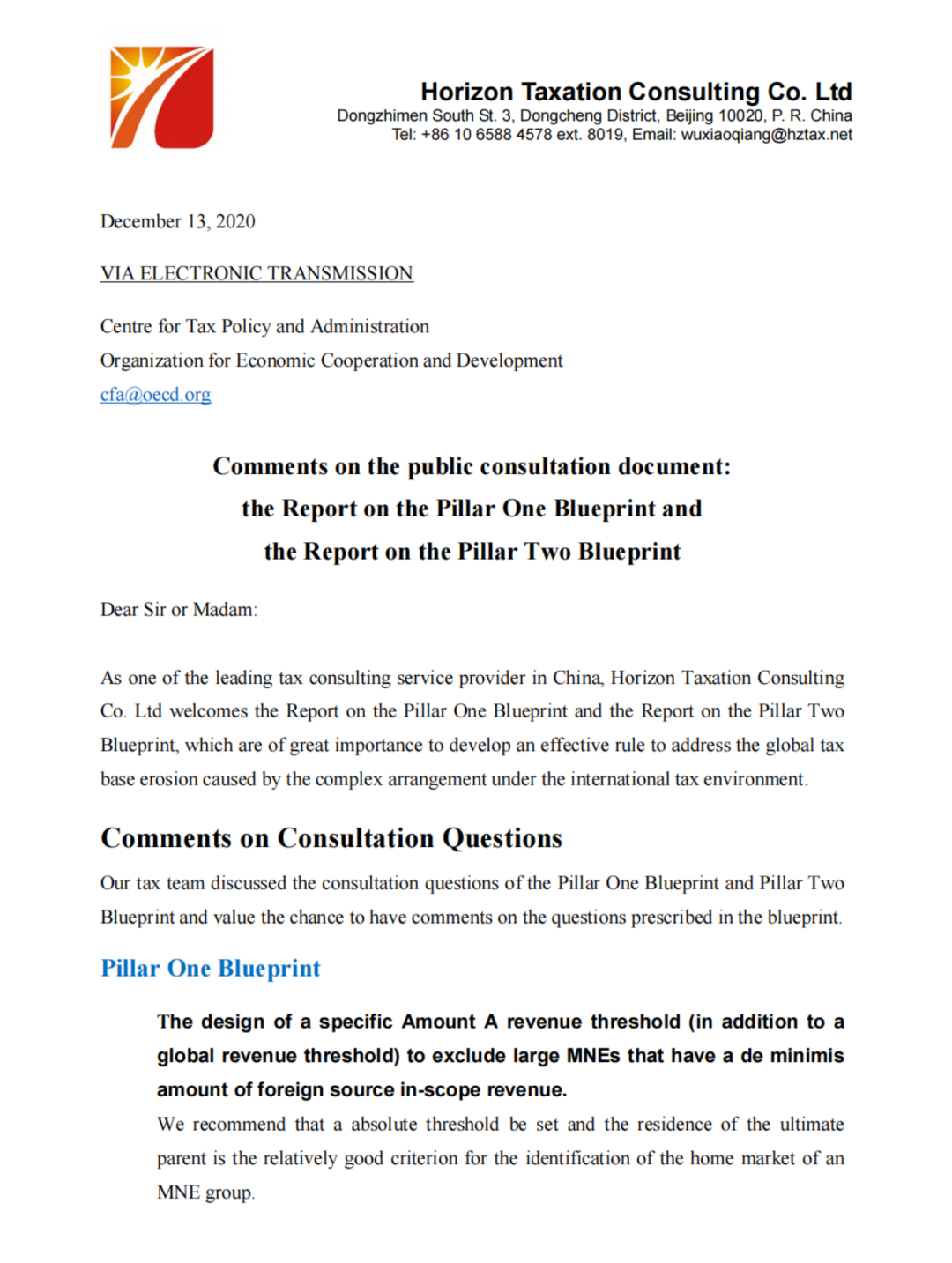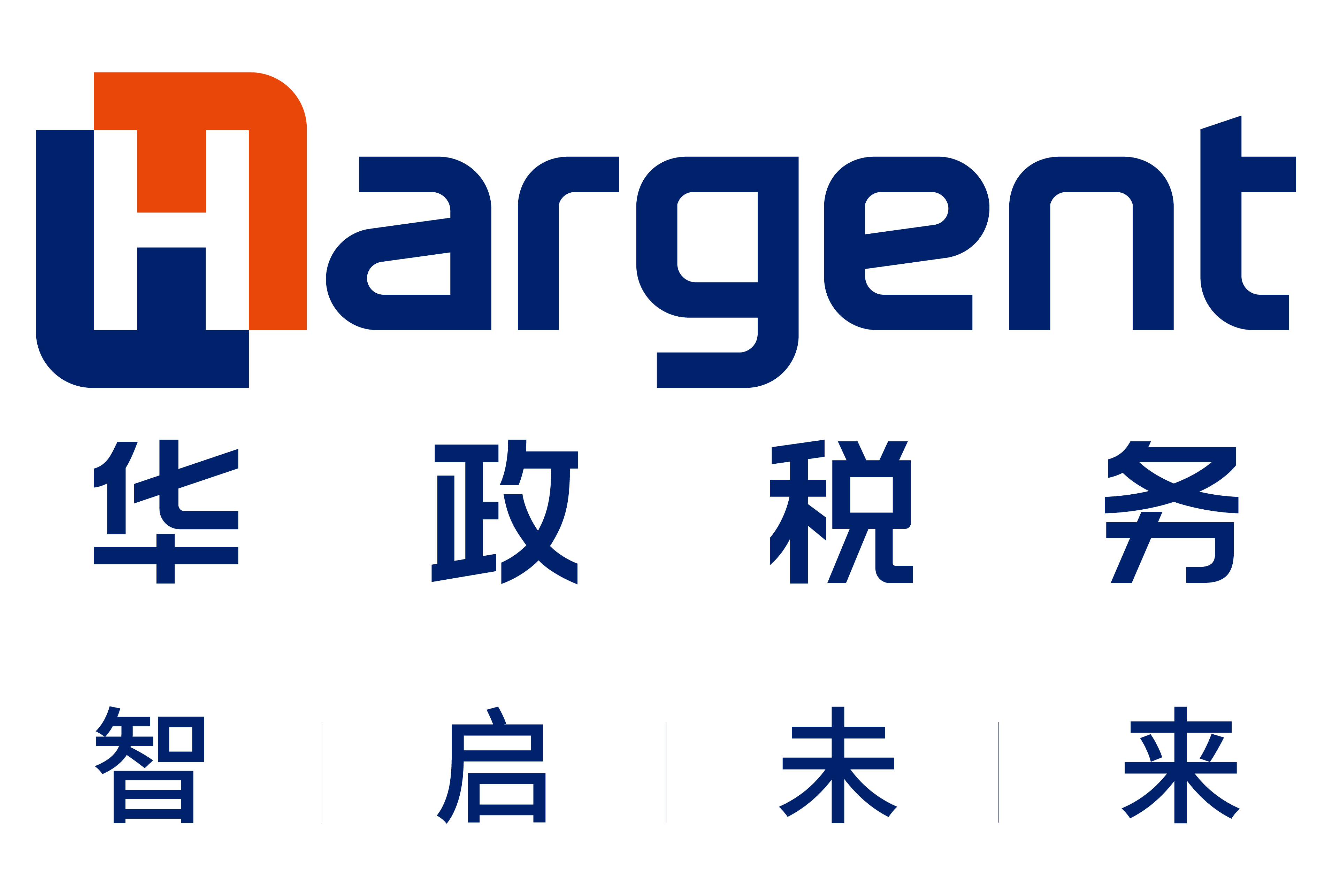On 20 December 2021, the Organisation for Economic Co-operation and Development (OECD) published the Pillar Two model rules for a two-pillar reform of international taxation to assist in the implementation of the landmark reform of the international taxation system that will To ensure that from 2023, multinational enterprises (MNEs) will be subject to a minimum tax rate of 15%.

The OECD/G20 Anti-Base Erosion Inclusive Framework previously planned to complete the work of the domestic legislative template by November 2021. The specific content of the template was officially announced today. The publication of the template means that the key technical details of the Pillar II scheme have been completed. Basically settled.
Hargent Tax has been continuously tracking and studying the OECD/G20 international tax reform in recent years, and is the only professional tax service organization in mainland China that has directly participated in the global opinion consultation on the G20/OECD international tax dual-pillar reform draft twice.
This article introduces the main content of the Pillar II legislative template, Hargent tax participation in and assisting Chinese-funded multinational enterprise groups and other relevant stakeholders to participate in international tax reform consultation and assistance, and proposes for Chinese-funded multinational enterprises to deal with the dual-pillar reform. Four work recommendations.
Outline of Pillar II Legislative Template
1. The role of the second pillar of the legislative template
The Pillar Two Legislative Template provides governments with a precise template to implement the two-pillar solution to the tax challenges posed by the digitization and globalization of the economy. For the content of the solution, please refer to this official account article "Bilingual in Chinese and English: Statement on the Dual Pillar Plan to Address the Challenges of Digital Taxation in the Economy". The solution has now received declarations of consent from 137 countries and jurisdictions under the OECD/G20 Anti-Base Erosion Inclusive Framework.
These provisions define the scope and mechanics of the Global Anti-Base Erosion (GloBE) rules under Pillar Two, which will introduce a global minimum corporate tax rate of 15%. The lowest tax rate will apply to multinational corporations with revenues of more than 750 million euros and is estimated to generate around $150 billion in additional global tax revenue each year
The Global Anti-Base Erosion (GloBE) rules provide for a harmonized tax regime designed to ensure that large multinational conglomerates pay this minimum tax on their income in each jurisdiction in which they operate. These rules create a tax whereby a "top-up tax" can be applied to any jurisdiction's profits as long as the effective tax rate determined by jurisdiction is below the 15% minimum rate.
2. The main content of the second pillar legislation template
The Pillar II legislative template will assist countries in incorporating the Global Anti-Base Erosion (GloBE) rules into domestic legislation in 2022. Templates provide a set of interconnected rule coordination systems that include:
The specific content structure of the legislative template
The specific content structure of the second pillar legislation template includes:
1范围Scope
条款1.1反税基侵蚀规则Scope of GloBE Rules
条款1.2跨国企业集团与集团MNE Group and Group
条款1.3成员实体Constituent Entity
条款1.4最终控股母公司Ultimate Parent Entity
条款1.5排除的实体Excluded Entity
2征税规定Charging Provisions
条款2.1收入纳入规则的应用Application of the IIR
条款2.2收入纳入规则下的补充税分配Allocation of Top-Up Tax under the IIR
条款2.3收入纳入规则抵消机制IIR Offset Mechanism
条款2.4低税支付原则的应用Application of the UTPR
条款2.5低税支付原则补充税税额UTPR Top-up Tax Amount
条款2.6低税支付原则下补充税的分配Allocation of Top-Up Tax for the UTPR
3反税基侵蚀规则中损益的计算Computation of GloBE Income or Loss
条款3.1财务会计Financial Accounts
条款3.2反税基侵蚀损益确定的调整Adjustments to determine GloBE Income or Loss
条款3.3国际航运收入的排除International Shipping Income exclusion
条款3.4主要实体与常设机构之间的损益分配Allocation of Income or Loss between a Main Entity and a Permanent Establishment
条款3.5从穿透实体取得损益的分配Allocation of Income or Loss from a Flow-through Entity
4有效税额调整的计算Computation of Adjusted Covered Taxes
条款4.1经调整的有效税额Adjusted Covered Taxes
条款4.2有效税额的定义Definition of Covered Taxes 23
条款4.3有效税额从一个成员实体到另一成员实体的分配Allocation of Covered Taxes from one Constituent Entity to another Constituent Entity
条款4.4处理暂时性差异的机制Mechanism to address temporary differences
条款4.5反税基侵蚀损失的选用The GloBE Loss Election
条款4.6申报后调整与税率变化Post-filing Adjustments and Tax Rate Changes
5有效税率与补足税的计算Computation of Effective Tax Rate and Top-up Tax
条款5.1有效税率的确定Determination of Effective Tax Rate
条款5.2补足税Top-up Tax
条款5.3基于实质的收入排除Substance-based Income Exclusion
条款5.4额外的当前补足税Additional Current Top-up Tax
条款5.5最低限度排除De minimis exclusion
条款5.6少数股权组成实体Minority-Owned Constituent Entities
6公司重组与持股架构Corporate Restructurings and Holding Structures
条款6.1集团合并与分立中合并收入门槛的应用Application of Consolidated Revenue Threshold to Group Mergers aDemergers
条款6.2加入或脱离跨国企业集团的组成实体Constituent Entities joining and leaving an MNE Group
条款6.3资产与负债的转移Transfer of Assets and Liabilities
条款6.4合资企业Joint Ventures
条款6.5多母公司的跨国企业集团Multi-Parented MNE Groups
7税收中性与分配制度Tax neutrality and distribution regimes
条款7.1作为穿透实体的最终控股母公司Ultimate Parent Entity that is a Flow-through Entity
条款7.2.适用股息扣除制度的最终控股母公司Ultimate Parent Entity subject to Deductible Dividend Regime
条款7.3适格税收分配体系Eligible Distribution Tax Systems
条款7.4投资主体的有效税率计算Effective Tax Rate Computation for Investment Entities
条款7.5投资主体的税收透明选用Investment Entity Tax Transparency Election
条款7.6应税分配方法的选用Taxable Distribution Method Election
8征管Administration
条款8.1申报义务Filing obligation
条款8.2安全港Safe Harbours
条款8.3征管指南Administrative Guidance
9过渡规则Transition rules
条款9.1 过渡性的税收Tax Attributes Upon Transition
条款9.2.实质收入排除的过渡性照顾Transitional relief for the Substance-based Income Exclusion
条款9.3处于全球活动初始阶段的跨国企业集团的低税支付规则适用排除Exclusion from the UTPR of MNE Groups in the initial phase of their international activity
条款9.4.对申报义务的过渡性照顾Transitional relief for filing obligations
10定义Definitions
条款10.1定义的术语Defined Terms
条款10.2穿透实体、税收透明实体和反向混合实体的定义Definitions of Flow-through Entity, Tax Transparent Entity, Reverse Hybrid Entity,
and Hybrid Entity
条款10.3实体与常设机构的位置Location of an Entity and a Permanent Establishment
立法模板的英文版全文,包括概述、常见问题以及关于规则应用的概况介绍,请访问:https://oe.cd/pillar-two-model-rules。
2022年支柱二改革展望
支柱二的具体规则大部分已经明确,未来还有模板注释、征管问题、应税规则示范条款等后续工作将得到进一步推进。2022年初,经合组织将发布有关立法模板的注释(Commentary),并处理与美国全球无形低税收入(GILTI)规则共存的问题。随后将制定一个执行框架(implementation framework),聚焦于与支柱二有关的征管、合规和协调问题。包容性框架还在制定应税规则(Subject to Tax Rule)示范条款(model provision)及其执行的多边工具,并于2022年上半年公布。有关执行框架的公众咨询活动将于2022年2月举行,有关应税规则的咨询活动将于2022年3月举行。
Participation of Hargent in international tax reform
Hargent is the only tax professional service organization in China that has participated in the global consultation on the OECD international tax dual-pillar reform draft twice in recent years.


2. Provide professional support for tax reform related stakeholders
In addition to directly providing professional advice to the OECD, Huazheng Tax International Department has also coached and trained a number of Chinese-funded multinational enterprise groups in recent years on the draft rules of the dual-pillar reform, assisting clients in evaluating the potential impact of the draft dual-pillar reform on international taxation on the client’s group and industry. potential impact, and assist clients to provide professional feedback on the draft reform to the national fiscal and tax authorities and the OECD.
Hargent International Taxation Department preached the progress and rules of international tax reform at important conferences such as China Construction Industry Finance and Taxation Conference and Digital Tax Forum, and participated in the annual meeting of the Hong Kong Taxation Society to understand the changes in international tax reform policies in the jurisdictions where common shareholders such as Hong Kong are located. , to help all parties understand and correctly assess the potential impact of reforms.
Hargent Tax International Department also provides advice and support to tax authorities and professionals from colleges and universities who have consulting needs. Huazheng Tax also organized the translation and collation of about 400,000 words of international tax reform materials, which are important issues for relevant parties in international tax reform. The research provides solid data intelligence support.
With the support of the "Internet + Finance and Taxation" alliance (jointly established by China's leading digital enterprises), the International Department of Huazheng Taxation and the Institute of Digital Taxation of Renmin University of China jointly set up a digital tax column to provide readers with relevant tax rules and information on a global scale. The latest information on collection and management has been released to the 12th issue so far.。
3. Provide customers with advice on BEPS2.0 reform response
Since 2020, Hargent has successively started to provide training on the OECD/G20 dual-pillar reform plan (also known as BEPS 2.0 reform) international tax reform for the headquarters and secondary units of many Chinese-funded multinational corporations in response to the tax challenges of economic digitalization , providing consultation on key professional topics, as well as providing overall consulting services for developing responses. These Chinese-funded multinational enterprise groups are mainly distributed in the fields of engineering and construction, energy and power, investment and trade.
Suggestions on Chinese-funded multinational companies responding to dual-pillar reforms
The impact of dual-pillar reform on Chinese multinational enterprises
The OECD/G20 dual-pillar reform program to address the tax challenges of the digitized economy is about to have a broad and profound impact on many multinational companies.
Pillar 1 balances in the short term the tax interests of the largest multinational corporations with their home jurisdictions and market jurisdictions. Regarding the impact of Pillar 1, the short-term impact is limited but the long-term impact is far-reaching. According to our calculations, among the approximately 100 companies in the world that are currently applicable to Pillar 1, there are approximately 8 Chinese companies (including Hong Kong, Macao and Taiwan regions). greatly increase. The impact of Pillar 1 in terms of rules is mainly due to the significant changes in the source of income rules to the traditional income tax principle based on the attributable profits of institutions.
At present, the threshold of 750 million euros for Pillar 2 is relatively low. Basically, all Chinese-funded multinational companies that need to submit country-by-country reports currently need to apply the Pillar 2 rules (including the domestic legislative template that has just been introduced). Under the Pillar II system, taxable rules and anti-base erosion rules constitute a new tax system, which is intended to plug the comprehensive tax avoidance loopholes of multinational companies and promote fair taxation of multinational companies around the world. The rules of Pillar 2 will have a significant impact on the global investment structure, related party transactions, tax planning, enjoyment of preferential policies, tax location and scale, jurisdiction and global tax burden of multinational enterprises.
Measures to be taken by Chinese-funded MNCs
To maintain tax efficiency and improve global competitiveness under the new rules, multinational corporations will need to respond aggressively. From now to 2023, when the world officially implements the dual-pillar rule, many multinational companies will carry out the assessment of the impact of the dual-pillar rule, focusing on the calculation of the tax burden of various jurisdictions around the world based on historical data or estimated data, and take measures to address the impact of the dual-pillar rule. Take proactive measures to adjust and optimize investment and business operation adjustment plans in a timely manner to ensure compliance when the new rules are officially implemented in 2023.。
3. Accurate calculation of tax reform indicators such as the actual effective tax burden
It is recommended to analyze and calculate key tax indicators and tax impacts, and calculate the actual effective tax rate ETR according to the country’s jurisdiction. It is necessary for the parent company to take the lead), calculate the location and scale of supplementary tax in the case of split ownership of investment equity at the ultimate holding parent company (UPE) and below, and calculate the tax impact of the adjustment of the results of low-tax related party transactions.
4. Develop and implement effective response plans
On the basis of financial data, organizational structure and business sorting, and tax reform index calculation based on the official tax reform plan and legislative template, the relevant results are analyzed in a combination of qualitative and quantitative methods, and the shareholding structure adjustment plan and related party transactions are proposed. Quantitative evaluation of the implementation effect of the response plan and transfer pricing arrangement optimization and other response plans, and implementation and promotion according to the planned timetable after decision-making.
Hargent Tax International Department will continue to track the progress of the dual-pillar reform and bring you the latest news introduction and professional analysis. Chinese multinational enterprise groups are also welcome to contact us regarding the assessment and response to international tax reform. We use our professional knowledge and acquired service experience to provide customers with comprehensive support.
责编 | 黄丽红
-

Set Sail for the Sea, With Tax Benefits - Analysis of the Types of VAT Export Refund (Exemption) and Key Points of Declaration Practice
2024-10-22read:728second
-

Enterprise Must Read! The New Policy of Water Resource Tax Reform Has Been Introduced, And This Article Summarizes the Key Points of Policy Changes
2024-10-22read:724second
-

The 'Crime' and 'Punishment' of Tax Violations: A Must-Read Guide for Financial and Tax Personnel
2024-09-12read:773second
This website uses cookies to ensure you get the best experience on our website.



 Wu, Xiaoqiang
Wu, Xiaoqiang









